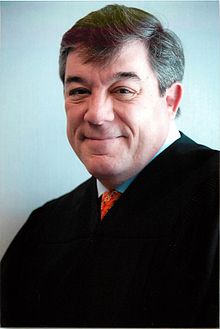The former prosecutor also has a relatively conservative record on criminal justice. A 2010 examination of his decisions by SCOTUSBlog’s Tom Goldstein determined that “Judge Garland rarely votes in favor of criminal defendants’ appeals of their convictions.” Goldstein “identified only eight such published rulings,” in addition to seven where “he voted to reverse the defendant’s sentence in whole or in part, or to permit the defendant to raise a argument relating to sentencing on remand,” during the 13 years Garland had then spent on the DC Circuit.
To be clear, Garland’s record does not suggest that he would join the Court’s right flank if confirmed to the Supreme Court. He would likely vote much more often than not with the Supreme Court’s liberals, while occasionally casting a heterodox vote. Nevertheless, as Goldstein wrote in 2010 when Garland was under consideration to replace the retiring liberal Justice John Paul Stevens, “to the extent that the President’s goal is to select a nominee who will articulate a broad progressive vision for the law, Judge Garland would be a very unlikely candidate to take up that role.”
Original Post -- DC people are predicting Sri Srinivasan. If you are looking to kill time until the announcement, you can read a summary of all of his opinions by Tom Goldstein here:
Srinivasan has few significant criminal law decisions. So far as I can determine, he has voted to overturn a criminal conviction only in a single case, in which he overwhelmingly rejected the defendants’ appeals. United States v. McGill, 2016 U.S. App. LEXIS 3734, No. 06-3190 (D.C. Cir. 2016) (member of unanimous per curiam majority) (overwhelmingly affirming convictions and sentences in large-scale drug racketeering case, although reversing with respect to a few limited issues). In the other cases, he affirmed. In re Sealed Case, 809 F.3d 672 (D.C. Cir. 2016) (member of unanimous majority) (rejecting challenge to sentence of supervised release); United States v. Zagorski, 807 F.3d 291 (D.C. Cir. 2015) (member of unanimous majority) (affirming child pornography sentence); United States v. Miller, 799 F.3d 1097 (D.C. Cir. 2015) (opinion for the Court) (rejecting challenges to fraud conviction); United States v. Cano-Flores, 796 F.3d 83 (D.C. Cir. 2015) (member of unanimous majority) (rejecting challenges to drug importation conviction but remanding for reassessment of $15 billion forfeiture); United States v. Ballestas, 795 F.3d 138 (D.C. Cir. 2015) (opinion for the Court) (upholding extraterritorial application of Maritime Drug Law Enforcement Act); United States v. Munoz Miranda, 780 F.3d 1185 (D.C. Cir. 2015) (rejecting attempt to challenge guilty plea); United States v. Arrington, 763 F.3d 17 (D.C. Cir. 2014) (opinion for the Court) (rejecting attempts to reopen criminal conviction); United States v. Baxter, 761 F.3d 17 (D.C. Cir. 2014) (member of unanimous majority) (rejecting challenges to fraud conviction); United States v. Garcia, 757 F.3d 315 (D.C. Cir. 2014) (member of unanimous majority) (rejecting challenges to conviction and sentence for cocaine importation); United States v. Fahnbulleh, 752 F.3d 470 (D.C. Cir. 2014) (member of unanimous majority) (affirming fraud convictions and sentences); United States v. Solofa, 745 F.3d 1226 (D.C. Cir. 2014) (member of unanimous majority) (rejecting challenge to conviction and sentence); United States v. Taylor, 743 F.3d 876 (D.C. Cir. 2014) (member of unanimous majority) (rejecting challenge to refusal to reduce crack cocaine sentence).
Srinivasan has also rejected a variety of other claims by criminal defendants, in addition to the filing fee ruling discussed above in which the Supreme Court agreed with his reading of the statute. Asemani v. United States CIS, 797 F.3d 1069 (D.C. Cir. 2015) (opinion for the Court) (upholding denial of in forma pauperis status to prisoner under three-strikes bar); Thomas v. Holder, 750 F.3d 899 (D.C. Cir. 2014) (member of unanimous majority) (rejecting prisoner’s appeal on the merits) (concurring opinion argues that Prison Litigation Reform Act’s three-strikes provision may be unconstitutional); United States v. Dillon, 738 F.3d 284 (D.C. Cir. 2013) (member of unanimous majority) (sustaining order to medicate defendant to render him competent to stand trial).
Srinivasan’s rulings favoring criminal defendants have been largely procedural. United States v. Mathis-Gardner, 783 F.3d 1286 (D.C. Cir. 2015) (member of unanimous majority) (remanding for explanation of decision to terminate supervised release); Daniel v. Fulwood, 766 F.3d 57 (D.C. Cir. 2014) (member of unanimous majority) (reinstating ex post facto challenge to parole guidelines); Payne v. Stansberry, 760 F.3d 10 (D.C. Cir. 2014) (member of unanimous majority) (reinstating claim for denial of effective appellate counsel); In re Miller, 759 F.3d 66 (D.C. Cir. 2014) (member of unanimous court) (authorizing filing of successive challenge to criminal defendant’s sentence); United States v. Wyche, 741 F.3d 1284 (D.C. Cir. 2014) (dissenting opinion) (dissenting in relevant part from sua sponte determination that sentencing determination was harmless).
In the search-and-seizure context, Srinivasan’s most interesting case found a violation of the Fourth Amendment over a dissenting opinion. United States v. Peyton, 745 F.3d 546 (D.C. Cir. 2014) (member of two-judge majority) (holding that evidence must be suppressed because third party lacked authority to authorize search of shoe box) (dissent would find authority to consent because shoebox was in common living area). But in another case, he found no Fourth Amendment violation under existing precedent and declined to join an opinion that would have revisited that precedent. United States v. Gross, 784 F.3d 784 (D.C. Cir. 2015) (opinion for the Court) (rejecting claim that police encounter amounted to Fourth Amendment seizure) (concurring opinion argues for overturning existing precedent).




